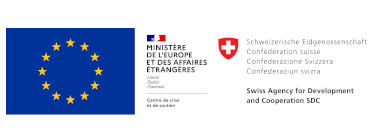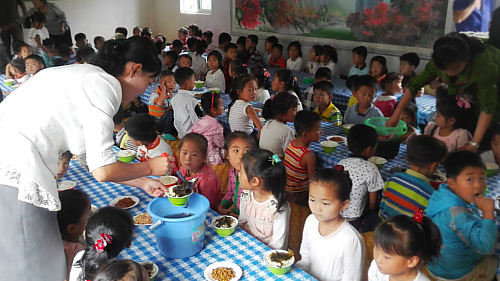Beneficiaries
235,000
Duration
01/01/15 > 01/01/19
Total budget
€1,338,348

Food security & Livelihood
Funding


Programme details
Partner
- APDRA Pisciculture paysanne : a French association specialising in fish farming projects, which has already been involved in previous initiatives.
In the districts of Onchon and Ryongchon in the Democratic People’s Republic of Korea (DPRK), children’s institutions received an average of 477 grams of fish per day over the whole of 2013. This is well below the national target of 200 grams per child per day. What’s more, North Korean children are by far the most vulnerable population group, with small daily food rations and a diet that is often unbalanced. This entails risks of physical and cognitive sequelae caused by poor diets on children, most of which are irreversible after the age of 24 months. For all these reasons, the project focuses primarily on providing access to protein for children aged between 6 and 24 months attending these centres and nursery schools, as well as for pregnant women. In addition, farmers working on North Korean farms lack the inputs and practical advice they need to improve their aquaculture techniques and systems.
TGH already has experience of fish farming in the DPRK. From January 2010 to October 2013, TGH carried out a programme funded by EuropeAid to introduce an integrated crop-livestock-fish farming system on two farms in South Hamgyong province. This action was carried out in collaboration with the Ministry of Aquaculture, whose capacities were strengthened throughout the project. The use of the integrated fish farming system, which was new to North Korea, led to a significant increase in fish production and aroused the interest of the Ministry of Aquaculture at local and national level in replicating this system.
Drawing on this experience and the lessons learned from previous projects, TGH has designed a new, similar project to apply the integrated fish farming system to other farming conditions, in the administrative areas of North Pyongan and Nampho. This project is being carried out in partnership with the Ministry of Aquaculture and APDRA to ensure that the technical support provided is sustainable.
The project began on 1 January 2015 and will last over four years. ElIe will cover three full fishing seasons and will also include a 6-month launch phase to refine the project. This rather long period is indeed appropriate in the DPRK context, where it takes time to introduce new techniques. By promoting better practice at institutional level, the project will provide a long-term response to the nutritional deficiencies in children’s diets.
To achieve these objectives, TGH will carry out a number of activities focusing on 3 main areas
- The fish production of the two fish farming cooperatives will be increased:
Firstly, cereals and manure will be used to feed the fish, produce fodder and fertilise the ponds, in order to start implementing the new integrated system. In addition, the farms’ infrastructure will be rehabilitated, technical and fishing equipment will be supplied, and staff will be trained, helping to modernise the two cooperatives.
- Post-production stages (distribution, storage and use) :
These are dysfunctional and lead to significant losses, and will be addressed and improved to ensure availability and access to food. These stages will be improved by decentralising storage and delivery mechanisms, which will enable fish farmers to preserve the quality of the fish. Storage facilities (cold rooms) will be built and/or rehabilitated, means of transport will be provided, and training in fish preservation and hygiene standards will be provided. Nutritional education training will be provided in the institutions on rinsing and preparing fish, as well as on the nutritional needs of children.
- The capacity of the Ministry of Aquaculture to manage and reproduce sustainable fish farming production systems will be strengthened:
This will involve strengthening the integrated fish farming system at two new sites in the western regions, and implementing innovative techniques (fry production/tank fish production) where integrated fish farming is not suitable, while improving the technical capabilities of the Ministry of Aquaculture.